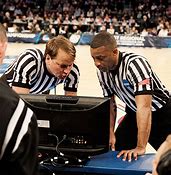Podcast: Play in new window | Download
Subscribe: RSS
Another weekend has passed, and, yet again, another news story has appeared about a serious problem involving the officiating in major sports events.
On Saturday afternoon in Baton Rouge, there was a thrilling battle for first place in the Southeastern Conference pitting the upstart #13 LSU Tigers against the #5 Tennessee Volunteers. The Tigers ultimately won the game in overtime, 82-80, and are now tied for first place with Kentucky.
Coming down the final minutes, the three game officials curiously and maddeningly stopped play on four different occasions and went to the video replay to review certain plays or to verify the time remaining in the contest.
The four stoppages of play broke the game’s momentum and forced both teams and the frenzied Tiger fans in the Pete Maravich Assembly Center to wait for ten minutes while the head referee asked for video replays.
The head referee spent 3:55 reviewing a possible change of possession (call upheld), 2:45 reviewing a restricted area issue (call upheld), and two time clock reviews (2:10 and 0:55) which added a miniscule total of .8 seconds back to the game clock.
None of the plays were reversed or significantly altered by these s-l-o-w video reviews. Neither of the coaches seemed to be demanding that the plays be reviewed.
This is simply another case of a creepy new disease which has now become epidemic in officials of all major sports.
Video replay addiction.
It has become quite obvious that game officials in major sports (basketball, football, and baseball) are becoming increasingly paranoid of making their own calls and then dealing with the pressure of having a video replay show a possible error.
On the other hand, referees can swallow their whistle and make no call at all, too. The NFC Championship game in New Orleans against the L.A. Rams comes to mind. Right, Saints fans?
One way or another, it’s time to do away with on-court referees and sports officials stopping game play by going to video replays as a “crutch” to avoid being blamed for possible errors.
ESPN’s two announcers at the game (including the legendary Dick Vitale) called-out the three referees for their unnecessary game stoppages as ruining the game for the players and fans alike.
Referees and game officials are paid to make judgment calls to keep the game played fairly. Just like in any other profession, their work will rarely approach perfection, but that is the goal.
In my opinion, many referees and game officials have become less and less confident in their own abilities and are acceding making key decisions by looking at a television replay. In doing so, they are becoming less reliant on their own personal judgment and becoming less effective on the field of play.
There is no way that officials of any sport will get everything right.
If perfection is your true goal, then it’s time for one or more sports to dismiss the on-court or on-field officials and give all officiating responsibility to the electronic reviews from the booth.
That seems very unlikely, but the recent dependence on game officials on a video “crutch” has made them less effective and too paranoid of making a mistake, too.
To help, here are a few ideas which I would like to see implemented IMMEDIATELY:
- For all officiated sports (across the board), the play stoppage cannot exceed more than one minute for any type of video review. If a decision cannot be reached in one minute, the play stands as called (or not called, Saints fans).
- The only exception to Rule #1 is on the final play of a game. For example, if the referees need to take a little more time on the final play to review the video evidence, then the play stoppage was worth it in order to be fair in getting the final review correct.
- The coaches of both teams should be allowed two video challenges per game to be used for any reason and at their discretion. The reviews shall last no longer than one minute (see Rule #1). If the coach’s challenge results in a changed call, then the coach retains the use of that challenge for another opportunity later in the game.
- The game officials may only stop play if they determine that the clock operator or scoreboard operator has made an obvious error. The review/change shall last no longer than one minute.
If sports leagues keep track of reversals, then it should become easier to determine the most competent officials and to discipline or dismiss the worst performers.
The time has come for the game officials (and the employers at their respective leagues) to get back to confidently calling sports contests again. I’d much rather see an official vigorously defend his/her decision with a coach rather than meekly slink over to the video replay for cover.
It is also time to speed-up play in all sports by providing a reasonable time period to review or challenge a play. One minute is plenty of time, agreed?
The time has come to help all game officials defeat this new 21st century condition called “Video Replay Addiction”. V.R.A. can and should be treated immediately!

